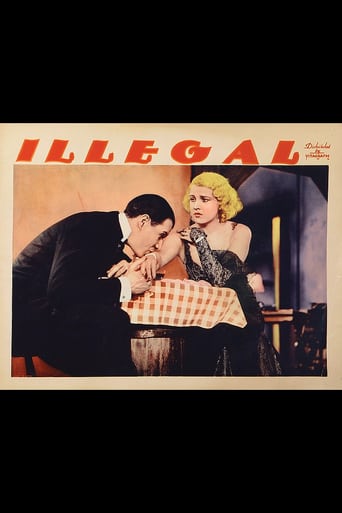JohnHowardReid
Oddly, Denis Gifford doesn't include this one is his splendid "British Film Catalogue", despite the fact that it was made at Teddington and the only non-Britishers in its entire cast and crew were photographer Willard Van Enger (his final film before turning his attention exclusively to special photographic effects), producer Irving Asher and director Bill McGann. The best thing about the movie is Margot Grahame, who has three songs – "Can't We Talk It Over?", "A Million Tomorrows" and "Was That the Human Thing To Do?" – which she puts across in fine style. At first, the script tries to play the illegal gambling issue from a refreshingly why-such-a-stupid-law point of view, but around the halfway point switches sides and comes down heavily on the always trust the conservatives if you want to stay safe, poor and helpless. Given the disjointed script, it's a wonder the players can give any sort of performance at all, but led by Isobel Elsom and Ivor Barnard, all succeed in bringing a bit of life to their inconsistent if pasteboard characters. The movie is available on an excellent Roan DVD.
David Frieze
I suppose it's barely possible that some people were moved by this tedious little "quota quickie" in 1932, but it's got precious little to recommend it these days. After kicking her wastrel husband out of the house, a woman decides to raise her two daughters to be respectable young ladies by running an illegal - and profitable - gambling house. It's not clear, at least to me, what the two girls were told when they asked why their mother was out of the house every night until after midnight, but that's only one of the many plot holes in this film. The acting isn't up to much, either - especially Moira Lynd, who plays the younger daughter, and who leaves a hole in the screen every time she appears - but then the hackneyed script and clumsy direction don't give the actors an awful lot to work with. There also seems to be some footage missing in the last couple of minutes, which results in abrupt edits and an unseemly rush to the finale.
MartinHafer
The early 1930s was a weird time in films in America and the UK. While some very adult topics were often seen in movies, many times the studio chose these very adult topics but was afraid to completely discuss them due to censor boards. In "Illegal" we have a story about a woman who MUST be a prostitute (albeit a high-class one) but the film keeps referring to her as a night club hostess. If she was only a hostess, why was it so shameful and such a dark secret?! The only thing that makes sense is that she sold her flesh--and 'night club hostess' was often a way to imply prostitution. If you look at the movie in this context, it makes everything make a lot more sense.The film begins with a woman becoming fed up with her no-good second husband and throws him out--giving him money to leave the country. He's a bum and has used up all their savings--so that she cannot afford to feed her two girls from a prior marriage (FYI--she's a widow). Without an income, she has no choice but to become A NIGHT CLUB HOSTESS (wink, wink). Through her very hard work, she is able to send them to an excellent high-class school and give them an air of respectability since her work life is a secret to most everyone. However, once the girls have grown, the secret leaks out and it impacts her girls--especially the dumb one! And, soon after, the estranged bum of a husband returns.This film has a lot of very salacious content. It's not too surprising as the film was financed by Warner Brothers--a company which was making its own salacious films in the States at the same time. I am surprised that British censors allowed this, however, as they were often rather restrictive (as the US would become in 1934 after the Production Code was reinforced). There of course is heavily implied prostitution but the film also includes incest near the end of the film! So is it worth seeing? Well, technically it's not a particularly distinguished film and often the plot makes little sense. However, if you love Pre-Code films because of their peculiar sensibilities, then this one DEFINITELY is for you, as most would marvel at how adult the film is. An interesting curio.
barnesgene
Much like "Striptease" (Demi Moore's film about a pole artist who must hide her true occupation to retain custody after a messy divorce), "Illegal" is about a mother who turns to running a gambling house in order to be able to afford to raise her children properly from a distance. But there are no clear signals from writers or director as to whether this was an ultimately wise choice, and so the moral message -- let alone the underlying sense of the plot -- remains largely ambiguous on the screen. The main character has a heart of gold, so why must she suffer her partial tragedy?There is also a rather flawed construction in the execution of the film: The last three or four scenes are perfunctory to the point of denying a proper catharsis with the characters, for whom you wouldn't mind rooting a bit more. One is left with the impression, for instance, that the younger daughter's relationship with the gentleman is nothing more than a piece of good luck. The concluding scene, while perfectly satisfactory in its own way, could have been enhanced with more searching, meaning-of-life-type dialog.In sum, a promising story, but too summarily dispatched.



